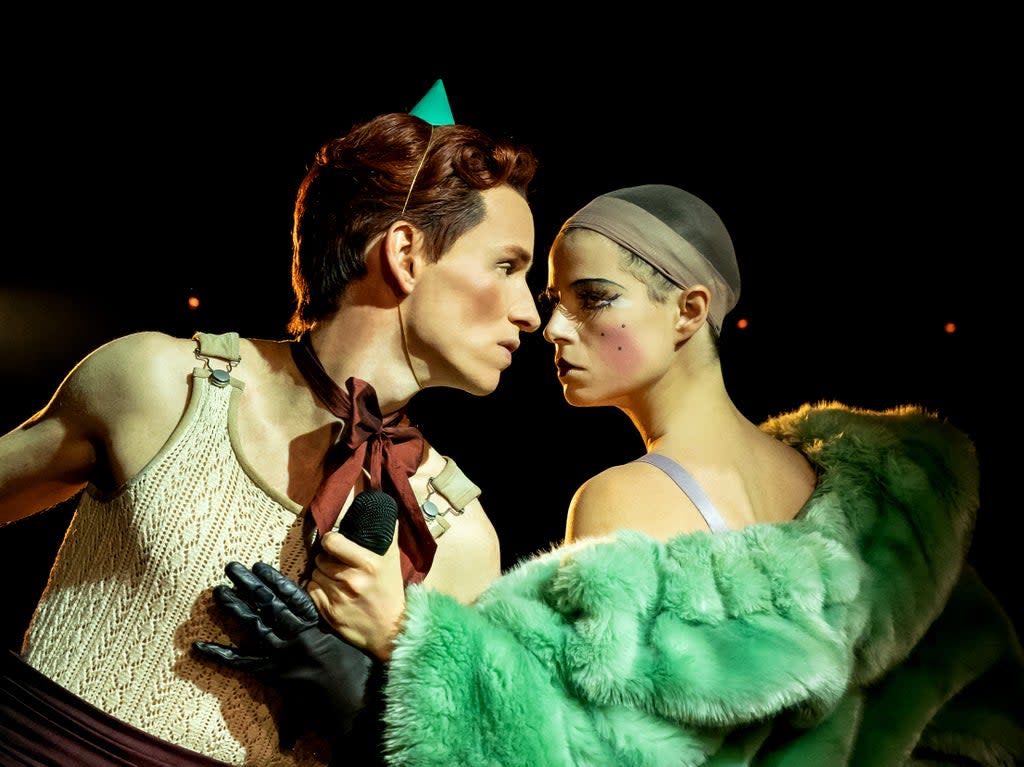Cabaret review: A vibrant and frightening revival that belongs to Jessie Buckley

- Oops!Something went wrong.Please try again later.
There is an air of dramatic secrecy around Rebecca Frecknall’s remarkable new production of Cabaret. Lest you are tempted to take a picture, stickers are placed over phone cameras as you enter the “Kit Kat Club”, the temporary new name of the Playhouse Theatre. The place has been transformed into the gloriously louche cabaret club of 1930s Weimar Berlin. Signs for the toilets are in English and German; the bathrooms are bathed in red light; dancers sit writhing on the bar.
Enter Eddie Redmayne as the Emcee, an impish, mercurial presence who serves as both compere of the cabaret and a sort of all-seeing narrator. In the strange and seductive opening number “Wilkommen”, he promises an escape from the real world – but his gurning presence becomes more disturbing, his songs a metaphor for the darkening soul of Germany as it descends in Nazism. Redmayne is excellent, contorting his sinewy body and singing with a closed-throated vibrato and hammed-up German accent.
The production belongs, though, to Jessie Buckley. As the club’s headline act Sally Bowles, an English woman of mediocre talent with grand delusions of stardom, she is both a free spirit and a lost soul. We first meet her dressed as a sort of clownish baby, winking, licking her lips, and flashing the audience as she sings the playfully off-colour “Don’t Tell Mama”. From the stage, Sally spots Cliff (It’s a Sin’s Omari Douglas), a poor American writer who has come to Berlin with the hopes of writing a novel. Sally takes a liking to Cliff, so when she’s fired from the club, she promptly moves into his tiny room in a boarding house run by Fraulein Schneider (Liza Sadovy, giving a quietly empathetic performance).
The middle-aged Schneider’s budding romance with a Jewish fruit-seller (Elliot Levey’s Herr Schultz) coincides with the wave of antisemitic sentiment sweeping across Germany. As soon as the first swastika appears – on the arm of Cliff’s friend Ernst Ludwig (Stewart Clarke), a reveal that prompts gasps from the audience – what began as a vibrant, camp, innuendo-laden riot twists into something genuinely frightening. At one point, as Redmayne wraps a glass in cloth and stamps on it – an allusion to the Jewish wedding tradition – a brick is thrown through Schultz’s window and we hear the ear-splitting sound of smashing glass. It is an eerie foreshadowing of Kristallnacht. The musical, first performed in 1966, was designed to shock, and though our threshold for that rises year by year, Frecknall still manages it – not least when a member of the troupe (Bethany Terry) starts masturbating to Mein Kampf.
Sally, meanwhile, is in her own world. She is pregnant by her former boss, and contemplating raising the child with Cliff, with whom she has fallen into a seemingly platonic relationship (it is usually implied, with different degrees of subtlety depending on the production, that Cliff is gay). Buckley nails the nuances and jarring contradictions of Sally, who wears so many impenetrable layers of bluster and bravado that in lesser hands she could be hard to get a handle on. When Buckley sings “Maybe This Time”, Sally’s only truly vulnerable moment, she keeps her arms crossed for the entire song, the decades of disappointment instead writ large on her face.
Surely the most powerful moment – and perhaps the best musical-theatre performance I have ever seen live – is Buckley’s rendition of the title song. While in many productions (the 1972 film with Liza Minnelli included) it is performed with peppy razzmatazz, here Buckley is a woman on the edge of a breakdown. “Life is a cabaret old chum,” she bellows, at first dripping with sarcasm and then spitting with fury. It is astonishing.
Back in the Sixties, the musical’s original director Hal Prince called Cabaret “a parable of contemporary morality”. In such capable hands, it’s a parable that still packs a punch.
Read More
David Harewood: ‘If I had my breakdown in America, somebody would’ve shot me’
Kirsten Dunst: ‘The pay disparity between me and Spider-Man was very extreme’
The Tragedy of Macbeth review: Saoirse Ronan breathes new life into timeless words

